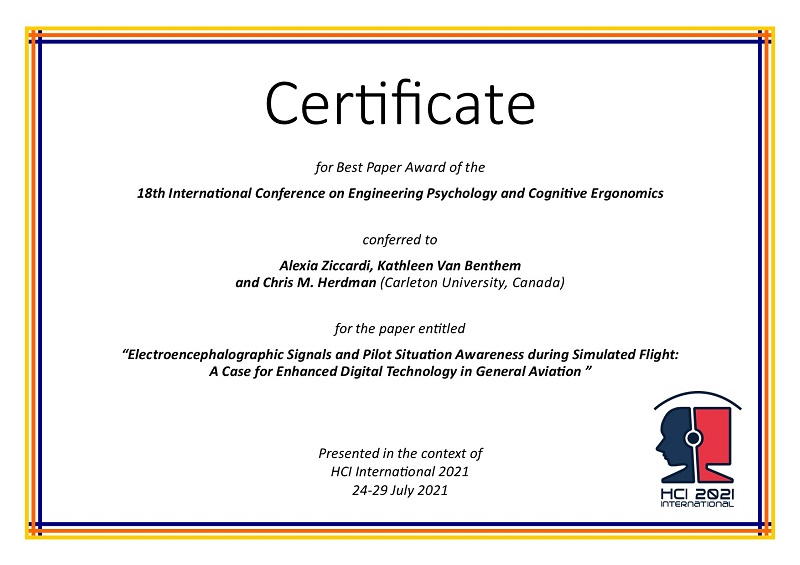
Certificate for Best Paper Award of the 18th International Conference on Engineering Psychology and Cognitive Ergonomics
The award has been conferred to
Alexia Ziccardi, Kathleen Van Benthem and Chris M. Herdman
(Carleton University, Canada)

Alexia Ziccardi
(presenter)
for the paper entitled
"Electroencephalographic Signals and Pilot Situation Awareness During Simulated Flight: A Case for Enhanced Digital Technology in General Aviation"
Presented in the context of
HCI International 2021
24-29 July 2021
Paper Abstract
"The present research reports on the effects of age and situation awareness (SA) on the neural processing of auditory tone stimuli presented during a simulated flight experiment to understand how pilots integrate auditory information into their mental models. Understanding the neuro-cognitive processes involved in transforming physical auditory stimuli into cognitive representations is important in the study of aviation psychology as a great deal of information about the environment that pilots receive and use to manage their flight is auditory (e.g., radio communication). Electroencephalogram (EEG) data was collected while 51 pilots conducted a one-hour flight in a Cessna 172 full-scale simulator and were presented with auditory tones. Markers were simultaneously added to the EEG data to reflect the onset of each tone and the pilot button response they were tasked with. Grand average event-related potentials (ERPs) related to the auditory tones compared neural responses for both the older (51+ years) and younger (<51 years) pilot groups. The relationship of age to accuracy of SA models was also investigated by indexing pilot mental models of the relevant environment. Findings showed that auditory information is not always well-integrated into SA models, and this was particularly true for older pilots. Furthermore, changes in how auditory information is processed in the brain may contribute to the negative age-effects seen in pilot SA. This research is important in informing efforts to enhance safety in general aviation. Effective strategies to improve pilot SA may include visual technologies to augment the auditory information available to pilots."
The full paper is available through SpringerLink, provided that you have proper access rights.